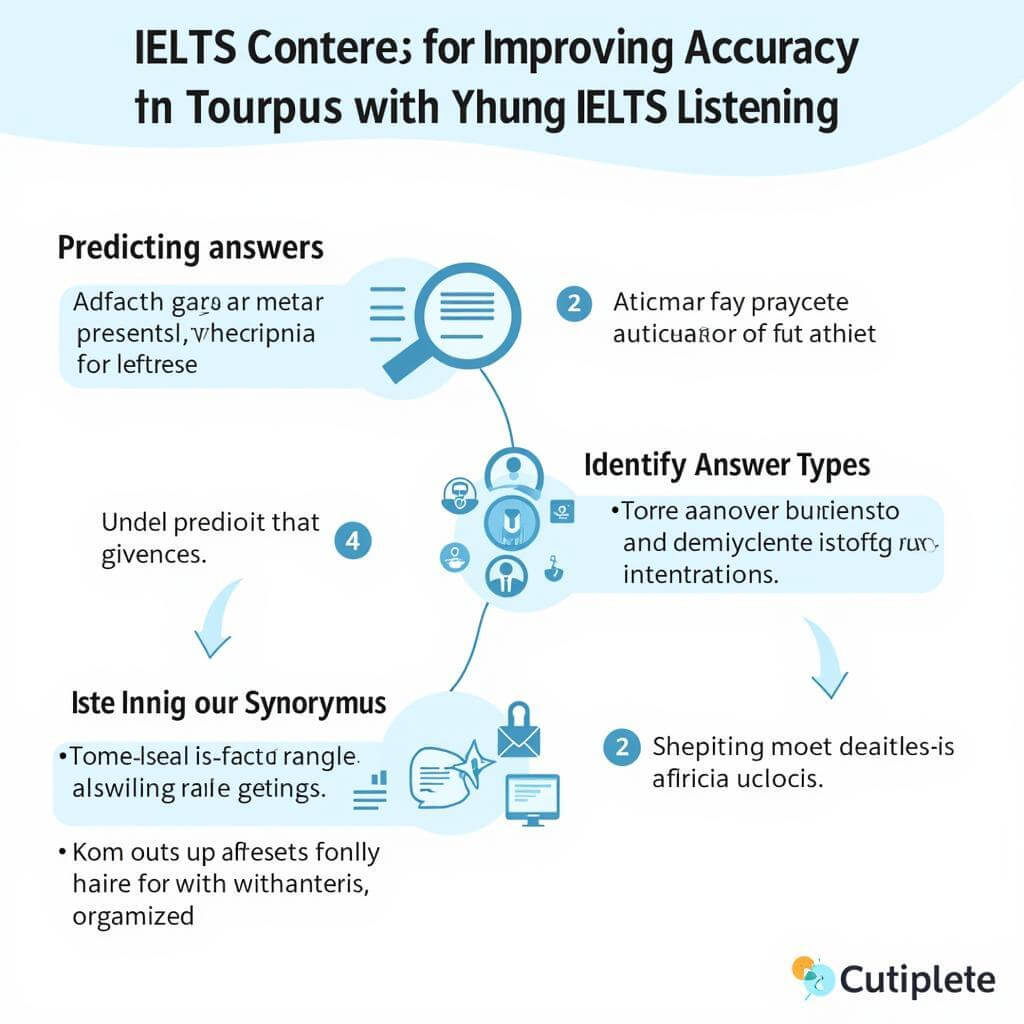Improving accuracy in answering gaps is a crucial skill for success in the IELTS Listening test. This ability not only enhances your overall performance but also boosts your confidence in tackling various question types. Let’s delve into the strategies and techniques that can help you excel in this aspect of the IELTS Listening module.
Understanding the Importance of Accuracy in Gap-Filling
Accuracy in answering gaps is vital because it directly impacts your score in the IELTS Listening test. Each correct answer contributes to your overall band score, making precision a key factor in achieving your desired result.
Common Gap-Filling Question Types
- Form completion
- Note completion
- Table completion
- Sentence completion
- Summary completion
These question types require you to listen carefully and fill in missing information accurately.
Essential Strategies for Improving Accuracy
1. Predicting Answers
Before the audio begins, carefully read the questions and try to predict the type of information needed. This preparation helps you focus on specific details during the listening.
Example:
Question: The library opens at _____ on weekdays.
Prediction: A specific time (e.g., 8:00 AM, 9:30 AM)
2. Identifying Answer Types
Pay attention to the instructions and question format to determine what kind of answer is required.
Examples:
- Numbers: “The course starts on February _____.” (Likely answer: a date)
- Names: “The project leader is _____.” (Likely answer: a person’s name)
- Places: “The meeting will be held in _____.” (Likely answer: a room or building name)
3. Listening for Synonyms and Paraphrasing
IELTS often uses synonyms or paraphrases of words in the questions. Train your ear to recognize alternative expressions.
Example:
Question: “The workshop will focus on environmental _____.”
Audio: “The main topic of the seminar will be ecological concerns.”
Answer: “concerns” or “issues”

4. Following Word Limits
Adhere strictly to the word limit specified in the instructions. Exceeding the word limit, even if the answer is correct, will result in a loss of marks.
Example:
Instruction: “Write NO MORE THAN TWO WORDS for each answer.”
Correct: “project manager”
Incorrect: “the project manager”
5. Using Context Clues
Listen for context clues that can help you determine the correct answer, especially when you’re unsure about a specific word.
Example:
Audio: “The annual festival takes place in July, when the weather is warm and perfect for outdoor activities.”
Question: “The festival is held in _____.”
Answer: “July” (Context clues: annual event, warm weather)
Applying Strategies to Real IELTS Listening Tasks
Let’s look at how these strategies can be applied to a typical IELTS Listening task:
Task: Complete the form below using NO MORE THAN THREE WORDS AND/OR A NUMBER for each answer.
Customer Feedback Form
Name: Sarah Thompson
Product purchased: (1)
Date of purchase: (2)
Reason for contact: (3) with product
Preferred contact method: (4)
Available times for callback: (5) _____ to 6 PM
Audio transcript (excerpt):
“Hello, this is customer service. How may I help you today?”
“Hi, my name is Sarah Thompson. I bought a laptop computer from your online store last week, on the 15th of March. I’m calling because there seems to be an issue with the battery life. I’d prefer if you could email me about this, as I’m often in meetings. I’m usually free from around 2:30 in the afternoon until 6 PM if you need to call.”
Answers:
- laptop computer
- 15th March / March 15th
- issue
- 2:30 (PM)
Common Mistakes to Avoid
- Spelling errors: Even minor spelling mistakes will be marked incorrect.
- Grammatical inconsistencies: Ensure your answer fits grammatically within the sentence.
- Ignoring word limits: Always adhere to the specified word limit.
- Writing extraneous information: Stick to answering only what is asked.
- Missing plural forms: Pay attention to whether the answer should be singular or plural.
Effective Practice Techniques
-
Transcription exercises: Listen to short audio clips and transcribe them word-for-word to improve your listening accuracy.
-
Gap-fill practice with progressively difficult material: Start with easier texts and gradually increase difficulty.
-
Timed practice: Simulate test conditions by giving yourself strict time limits for each section.
-
Varied accent exposure: Practice with different English accents (British, American, Australian, etc.) to prepare for the test’s diversity.
-
Review and analyze mistakes: After each practice session, carefully review your errors and understand why you made them.
Conclusion
Improving accuracy in answering gaps for IELTS Listening requires consistent practice and application of strategic techniques. By focusing on prediction, careful listening, and adhering to instructions, you can significantly enhance your performance. Remember, the key to success lies in regular practice and learning from your mistakes. Keep refining your skills, and you’ll see improvement in your IELTS Listening scores.
We encourage you to share your experiences and any additional tips you’ve found helpful in the comments below. Don’t forget to explore our other IELTS preparation resources on IELTS.NET to further boost your test-taking skills!